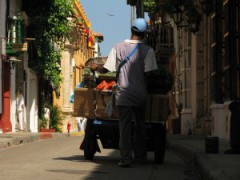-

¿Inversión social o derroche público? Brasil camino a la Copa
Abstract: In contrast to the calls for austerity made by European governments in recent months, the Brazilian government defends the idea that social and public investment is the way that states can overcome the specter of recession and bankruptcy. In Brazil, this policy has resulted in a program implemented since […]
-

Austeridad y vulnerabilidad: el caso de los pensionados de Nicaragua
Abstract: Nicaragua is the second poorest country in the western hemisphere. Their economic crisis is so severe that over 50,000 senior citizens are denied a pension that is rightfully theirs under the premise of austerity. Part of the strategy of Daniel Ortega’s government to remain in office is to provide […]
-

El $ueño americano: La historia de un reencuentro
(Fotos familiares del autor de este texto. Puede hacer click en cada una para verlas en tamaño grande). Abstract: Many Colombians, motivated by different reasons, have migrated to the United States in recent years. In my family’s case, the decision to migrate led to a long separation, and an emotional […]
-

La industria turística en Cartagena de Indias: mercado cultural, identidades fluctuantes
Abstract: During the past ten years, Cartagena de Indias in Colombia, one of the most important commercial and slave trader ports of the Colonial Hispanic America, has become an international destination loved by tourists from around the globe. Nearly 6 million visitors arrive every year. Considering that the native population just surpasses one […]
-

Trabajo doméstico remunerado: la tarea pendiente de América Latina
Abstract: 52.6 million people around the world work as domestic workers. 90% of them are women. 19.6 million are in Latin-America and the Caribbean. The lack of governmental regulations for these kind of workers has permitted that a high number of women, but also children and/or adolescents, live in conditions […]
